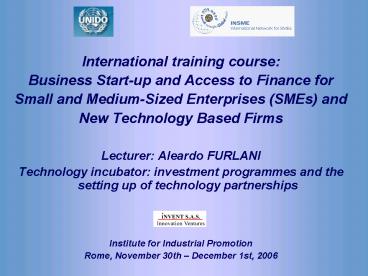International training course: PowerPoint PPT Presentation
1 / 12
Title: International training course:
1
- International training course
- Business Start-up and Access to Finance for
- Small and Medium-Sized Enterprises (SMEs) and
- New Technology Based Firms
- Lecturer Aleardo FURLANI
- Technology incubator investment programmes and
the setting up of technology partnerships - Institute for Industrial Promotion
- Rome, November 30th December 1st, 2006
2
Knowledge is a new kind of asset/1
- The foundation of industrialized economy is
shifting from natural resources to intellectual
assets - Knowledge assets are factors of production that
more important than traditional resources of
capital, labor and land. - Value creators can transform markets overnight
by exploiting converging technologies and rapid
innovations.
3
Networking is a new kind of asset/2
- Networking knowledge generators/value creators is
the key challenge and Technology Transfer is the
driver - Open Science
- Licensing
- Collaborative Model
- Mobility of Researchers
- Training
- Spin-outs
4
Services Technology watch, Partner search, IPR,
BPR, Business Plan, Technology Marketing,
Financing, VC and Seed Capital
- Spin-out Model
- From Research to Value creation you can create
innovation through Technology Transfer
Sale
Production
Development
Research
End-User
5
- Spin-out mod works in Europe, but can improve
- Builds on the Licensing Model
- Background technology used as platform to develop
new business concepts - Proof of principle by the researchers themselves
- Development housed in company structure funded by
seed capital and virtual capital - Only alternative when no industry partner in
sight - Contributes to regional development
- Contributes to rejuvenating economy
- Slow process more than 10 years for mature
companies
6
How to support the creation of durable spin-outs?
- They are created spontaneously by entrepreneurs
- Creation can be increased by Technology Parks and
Incubators - Pre-seed and seed capital
- Technological and Communication Infrastructures
- Training and coaching of entrepreneurs
- Recognition and entrepreneurship culture
- Sustainability is still a problem
- Financial performance(see Finland)
- Access to talents
7
The European Union experience
- Innovating Regions in Europe (best practices,
learning platform, inter-regional projects,
Benchmarking, Trend Chart) - Structural Funds (Objective 1 regions)
- Office of Technology Transfer(Industrial Liaison
Offices) - EIB, European Framework Program
- Lisbon objectives
8
The Finnish experience
- Finlands redevelopment in 90s22 Science Parks
established - Science Parks working close to Universities to
promote the creation of new business in the
region - They foster the funding the growth and the
internationalization of innovative high tech
companies - Act as middle-med in collaboration with
Universities, companies and local authorities - Bring together many players in joint RD projects
- Actively identify research breakthroughs in
commercialization and technology transfer
9
Other Country System experiences
- The development of Singapore high-tech activities
is linked to the development of 6 Science Parks - Tunisia is developing a network of 10 Technology
Parks as a key drivers of development - India clustered its development in through
Science parks development and China, Brazil and
Balkans show similar patterns - Learning points
- strong relation to national policies tax
incentives, linkage mechanisms and support for
training. - Key role of Foresight mechanism, to promote
innovation and sustain development in
high-technology domains. - Specialised service companies provide consultancy
services and R and D for local industries through
contracting academics from the university. - Technology incubators, show to be an instrument
for enhancing economic growth, restructuring and
development through technology diffusion and its
commercialisation.
10
Technology Incubators development features/1
- Typical Six Stages Country System development
model - basic research, development research, product and
process ideas, prototype, production, diffusion - But
- Too much focus on the pushside
- Basic research is not the only initiator stage
but can help - Relationship between research and
commercialization is too complex to be linear - Users are the key pull though not exclusive-to
the problems and markets - Therefore
- technology Parks can be the place where pull
and push happenprojects, spin-outs,
collaborations, ideas generation,finance - Mixed Roles (researchers/entrepreneurs) and
competences (Science/Market) generate competitive
advantage - Professional management
11
Technology Incubators development features/2
- 1. Demonstrating the future
- Breaking the isolation
- Excite the youth in Science and Technology
- Show that there is a potential for careers in
technology fields - 2. De-emphasise (not eliminate) the public
funding role more market is needed.Access to
finance, access to opportunities. - 3. Develop Technology showcases
- Creating the partnerships and platforms for
innovation - Foster Internationalisation, often leads to
research - New ways of stimulating knowledge generators and
value creators interaction - 4. Urban design
- Safety, shared facilities
- Social spaces for networking and cross
fertilisation
12
FINAL REMARKS
- Conditions of success ,not a fixed blueprint
but clear concepts, effective leadership, broad
support in the community, and sustained policy
commitment. Caution measuring success is
difficultemployment? financial performance? of
whom? - The Importance of Partnerships working with the
private sector is an important means for the
laboratories to accomplish their missions.
Attracting and keeping the best scientists and
the the best entrepreneurs is required. - Institutional Design public-private partnerships
must benefit both the public and industry. The
system needs an atmosphere in which knowledge
flows quickly, and failure is not a stigma. - Operational Challenges in creating
government-industry partnerships, harder
challenges in maintaining. Clear role definition
and medium-long term perspectives are necessary.

